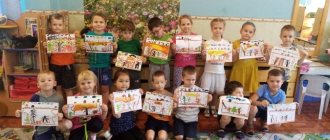What is not recommended to do when preparing preschoolers
Some parents begin to actively engage with their child from the age of three. But at this age, the child is not yet diligent enough, and therefore learning the basics of reading and writing is a difficult task for him. It is better to invite your child to try himself in different sports or creativity. The baby will be able to choose what he liked best and start doing it. Attending such clubs and sections will make the child more responsible and organized.
But it is better to teach a child to read syllables from the age of five. The problem with teaching a preschool child at home is that parents often organize classes inconsistently and unsystematically, and are not based on curriculum.
Parents have to be patient, since the child cannot understand everything the first time. Under no circumstances should you scold a child for mistakes; they need to be sorted out with him. You cannot use ultimatums and threats in the learning process, since this will not bring a positive result in learning, but will cause persistent rejection of future school everyday life.
The load on the child should increase gradually. You can start with five tasks a day, gradually increasing their number. Try to praise your child for every correct step, because for him this is an achievement. Each new lesson should begin with a repetition of the material already studied. You should also try to give more tasks to complete independently, so that the child can cope with them without parental help.
A common mistake in homework is irrational allocation of time - the child is overloaded with information, forgetting about breaks and the need to change activities. All this affects the child’s well-being and the effectiveness of learning. To avoid these and other common mistakes, many parents prefer to send their children to preparatory courses rather than teach them themselves.
"LogicLike"
logiclike.com
This is not an online school with a tutor, but an interactive platform with games that develop memory, logic, counting and writing skills. 3500 tasks to prepare for 1st grade - this will be enough until the end of the summer. All of them are divided into levels (more than 200). The mechanics are addictive and simple: you complete tasks, earn stars, and move to the next level. It works like any other game on the computer, only here it is not only fun, but also useful. More details
"It's clear"
ponyatno.ru
Only individual lessons with selected teachers. A lot of practice and skill development in five areas: mathematics, reading, speech development, the environment, logic and attention. Training proceeds in stages - first the basics are mastered, and more advanced skills are built on top of them. Until a child has mastered the basics, no one pushes him with difficult tasks. Everything is gradual. More details
Choosing a development center for preschoolers
Visiting developmental children's centers not only gives the child the opportunity to gain new knowledge, but also contributes to the development of his communication skills with peers. During the learning process, children become more active, proactive and self-confident. When choosing a good child development center, parents should focus on the teaching staff, security system and reviews. Many child development centers provide the opportunity to attend demonstration classes to understand the methodology of work and evaluate its quality.
Classes must be conducted regularly, only then will it be possible to achieve high-quality results. In children's development centers for preschoolers, much attention is paid to revealing the child's creative abilities, communication and cognitive skills. There is no place for monotonous and boring lessons here, because all classes are conducted in a playful way.
The AMAKids Academy for the Development of Intelligence offers effective programs for teaching children to read - “Bukvarika” and “Chitarika”. They are suitable not only for preschool children, but also for those who have already reached primary school age. The programs allow you to acquire and improve skills in working with text, as a result of which the child will be able to learn to read large volumes of text fluently and thoughtfully. Preparation at this level will allow the child to master the school curriculum more productively in the future.
Whether it is worth engaging in preschool preparation of your child, contacting children's development centers or not is up to you to decide. But even if you have a lot of time to organize the education of a preschool child on your own, then visiting sections will still not be superfluous. The child will not only acquire basic reading and writing skills, but will also learn to get along better with peers, which will help him adapt to school more easily. The student will feel more confident as he will have all the necessary skills to learn effectively and interact with classmates.
What should a child be able to do for school?
A lack of understanding of what knowledge and skills a future first-grader needs is one of the main problems of parents. Schools do not present a list of requirements for first-graders, so parents do not always understand what they should prepare for. However, there are obvious basic skills that primary school children cannot do without.
When attending kindergarten, children of the older group master the preschool program. A child needs to know the alphabet and numbers up to ten, navigate in time and space, have writing and connected speech skills, and have developed logical thinking. Before school, a child must clearly understand the difference between vegetables and fruits, domestic and wild animals, birds and insects, know the sequence of days of the week and seasons, be able to name colors and solve riddles.
At an interview, future first-graders at school may be asked about basic traffic rules, countries, holidays and famous professions, as well as tested for their reading skills in words and syllables, knowledge of some geometric figures and the ability to solve simple arithmetic problems. The interview helps to understand how physically, emotionally and intellectually the child is ready for school, whether he communicates freely with people, and whether he can express his point of view.
The best age to start preparatory classes
Many parents wonder when is the best time to start preparing their child for school. Some people start working with their children when they are two or three years old, while others don’t see the need for preschool classes at all. Today there are a lot of exercises and practical recommendations for teaching preschool children at home.
Children during this period are inquisitive and easily perceive information in a playful way. If a child begins to actively show interest in learning, asks questions about the objects and phenomena around him, tries to read letters and learn numbers, builds the first cause-and-effect relationships, then he is ready for classes.
The main task of adults is to maintain the child’s interest, help him look for answers to important questions and not refuse help. The age of 5-6 years is optimal for starting to prepare a child for school. Classes should help the child psychologically and intellectually prepare for a new stage in life. Without them, it will be very difficult for him to adapt to high academic loads.
"Unicum"
unsplash/Annie Spratt
Large courses where you can study both in a group and individually. Lots of game material, comprehensive training, training all skills at once - from reading and counting to emotional intelligence and financial literacy. The lessons are intensive, so they are taught only by experienced teachers who combine different teaching methods. More details
Svetlana Orochko
youtube.com/SvetlanaOrochko
Svetlana’s course is free, lessons are posted on YouTube. More than 70 thousand people are subscribed to this channel. And for good reason! Svetlana is a professional primary school teacher and preschool teacher. She records the lessons as she teaches them to her students in the classroom. It turns out the same thing, only on video and available to any child in the world. The only negative is that new classes appear on the channel very rarely. More details





